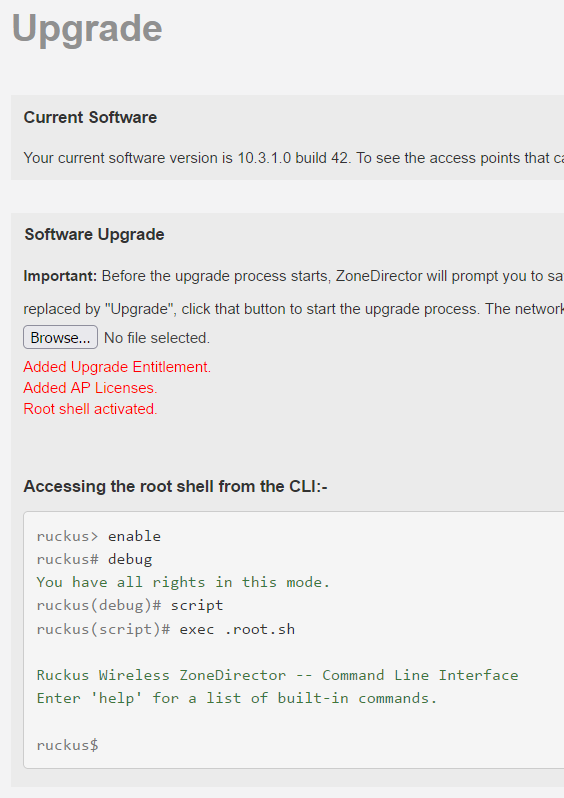Obtaining a root shell on Ruckus ZoneDirector
ZoneDirector releases after 31 Aug 2023 (e.g. 10.2.1.0.236+, 10.5.1.0.265+)
Ruckus implemented firmware signing in ZoneDirector 10.2.1.0 build 236 and 10.5.1.0 build 265.
So you will need to download an older 10.2.1.0 or 10.5.1.0 build from https://support.ruckuswireless.com/software (e.g. I used 10.5.1.0 build 255) and do an 'upgrade' (Administer > Upgrade).
TIP
Your support entitlement isn't checked if you're just installing a different build of the currently installed ZoneDirector version.
Now you can follow the procedure, below, for older ZoneDirector releases.
Note that you will lose your Root Shell if you re-upgrade your ZoneDirector.
ZoneDirector releases 15 Nov 2019 - 31 Aug 2023
The procedure below permanently adds a root shell command to your ZoneDirector CLI.
If you prefer a temporary, one-time use, root shell then follow the instructions here.
This patch should be uploaded as a Software Upgrade (Administer > Upgrade > Software Upgrade).

TIP
The upload process completes the patching; no upgrade will be offered. Instead you will be given instructions on using the root shell.
TIP
The upgrade will also add a temporary Upgrade Entitlement if necessary. Subsequent software upgrades will disable the root shell: you will need to re-apply this patch each time you upgrade your ZoneDirector's software.
In case you miss the instructions, to access the root shell from the CLI:-
ruckus> enable
ruckus# debug
You have all rights in this mode.
ruckus(debug)# script
ruckus(script)# exec .root.sh
Ruckus Wireless ZoneDirector -- Command Line Interface
ruckus$Creating the Patch Image yourself (from Linux or WSL)
#!/bin/bash
function rks_encrypt {
RUCKUS_SRC="$1" RUCKUS_DEST="$2" python3 - <<END
import os
import struct
input_path = os.environ['RUCKUS_SRC']
output_path = os.environ['RUCKUS_DEST']
(xor_int, xor_flip) = struct.unpack('QQ', b')\x1aB\x05\xbd,\xd6\xf25\xad\xb8\xe0?T\xc58')
structInt8 = struct.Struct('Q')
with open(input_path, "rb") as input_file:
with open(output_path, "wb") as output_file:
input_len = os.path.getsize(input_path)
input_blocks = input_len // 8
output_int = 0
input_data = input_file.read(input_blocks * 8)
for input_int in struct.unpack_from(str(input_blocks) + "Q", input_data):
output_int ^= xor_int ^ input_int
xor_int ^= xor_flip
output_file.write(structInt8.pack(output_int))
input_block = input_file.read()
input_padding = 8 - len(input_block)
input_int = structInt8.unpack(input_block.ljust(8, bytes([input_padding | input_padding << 4])))[0]
output_int ^= xor_int ^ input_int
output_file.write(structInt8.pack(output_int))
END
}
cat <<END >metadata
PURPOSE=upgrade
VERSION=10.99.99.99
BUILD=999
REQUIRE_SIZE=1000
REQUIRE_VERSIONS=9.9.0.0 9.10.0.0 9.10.1.0 9.10.2.0 9.12.0.0 9.12.1.0 9.12.2.0 9.12.3.0 9.13.0.0 9.13.1.0 9.13.2.0 9.13.3.0 10.0.0.0 10.1.0.0 10.1.1.0 10.1.2.0 10.2.0.0 10.2.1.0 10.3.0.0 10.3.1.0 10.4.0.0 10.4.1.0 10.5.0
REQUIRE_PLATFORM=nar5520
REQUIRE_SUBPLATFORM=cob7402
END
cat <<END >all_files
*
END
cat <<END >upgrade_check.sh
#!/bin/sh
support_status=\`cfg support-list.status | cut -d" " -f 2\`
if [ ! "\$support_status" -eq "1" ] ; then
cat <<EOF >/writable/etc/airespider/support-list.xml
<support-list status="1">
<support zd-serial-number="\`cat /bin/SERIAL\`" service-purchased="802" date-start="`date +%s`" date-end="1819713600" ap-support-number="licensed" DELETABLE="false"></support>
</support-list>
EOF
echo "Added Upgrade Entitlement.\n<br />"
fi
mount -o remount,rw /
cd /etc/persistent-scripts
cat <<EOF >.root.sh
#!/bin/sh
#RUCKUS#
/bin/stty echo
/bin/sh
EOF
chmod +x .root.sh
rm -f /writable/etc/scripts/.root.sh
ln -s -f /etc/persistent-scripts/.root.sh /writable/etc/scripts/.root.sh
mount -o remount,ro /
echo "Root shell activated.\n<legend>Accessing the root shell from the CLI:-</legend>\n<pre><code><span class=\"text-muted\">ruckus> </span>enable\n<span class=\"text-muted\">ruckus# </span>debug\n<span class=\"text-success\">You have all rights in this mode.</span>\n<span class=\"text-muted\">ruckus(debug)# </span>script\n<span class=\"text-muted\">ruckus(script)# </span>exec .root.sh\n\n<span class=\"text-success\">Ruckus Wireless ZoneDirector -- Command Line Interface</span>\n<span class=\"text-success\">Enter 'help' for a list of built-in commands.</span>\n\n<span class=\"text-muted\">ruckus\$ </span></code></pre>"
END
chmod +x upgrade_check.sh
rm -f zd.patch.tar zd.patch.tar.gz
tar czf zd.patch.tgz metadata all_files upgrade_check.sh
rks_encrypt zd.patch.tgz zd1200.rootshell.patch.img
rm all_files metadata upgrade_check.sh zd.patch.tgzZoneDirector 9.x/10.x releases prior to 15 Nov 2019
Use CVE-2019-19834:-
ruckus> enable
ruckus# debug
You have all rights in this mode.
ruckus(debug)# script
ruckus(script)# exec ../../../bin/sh
Ruckus Wireless ZoneDirector -- Command Line Interface
Enter 'help' for a list of built-in commands.
ruckus$ stty echo
ruckus$ZoneDirector 3.0 - 8.x
The CLI has an unprivileged !v54! command which drops you straight to the root shell:-
ruckus% !v54!
ruckus%TIP
Really though, you should just upgrade to 9.3 or later.
If you're still using 3.0 because upgrade functionality is broken on modern PCs then follow the steps here.